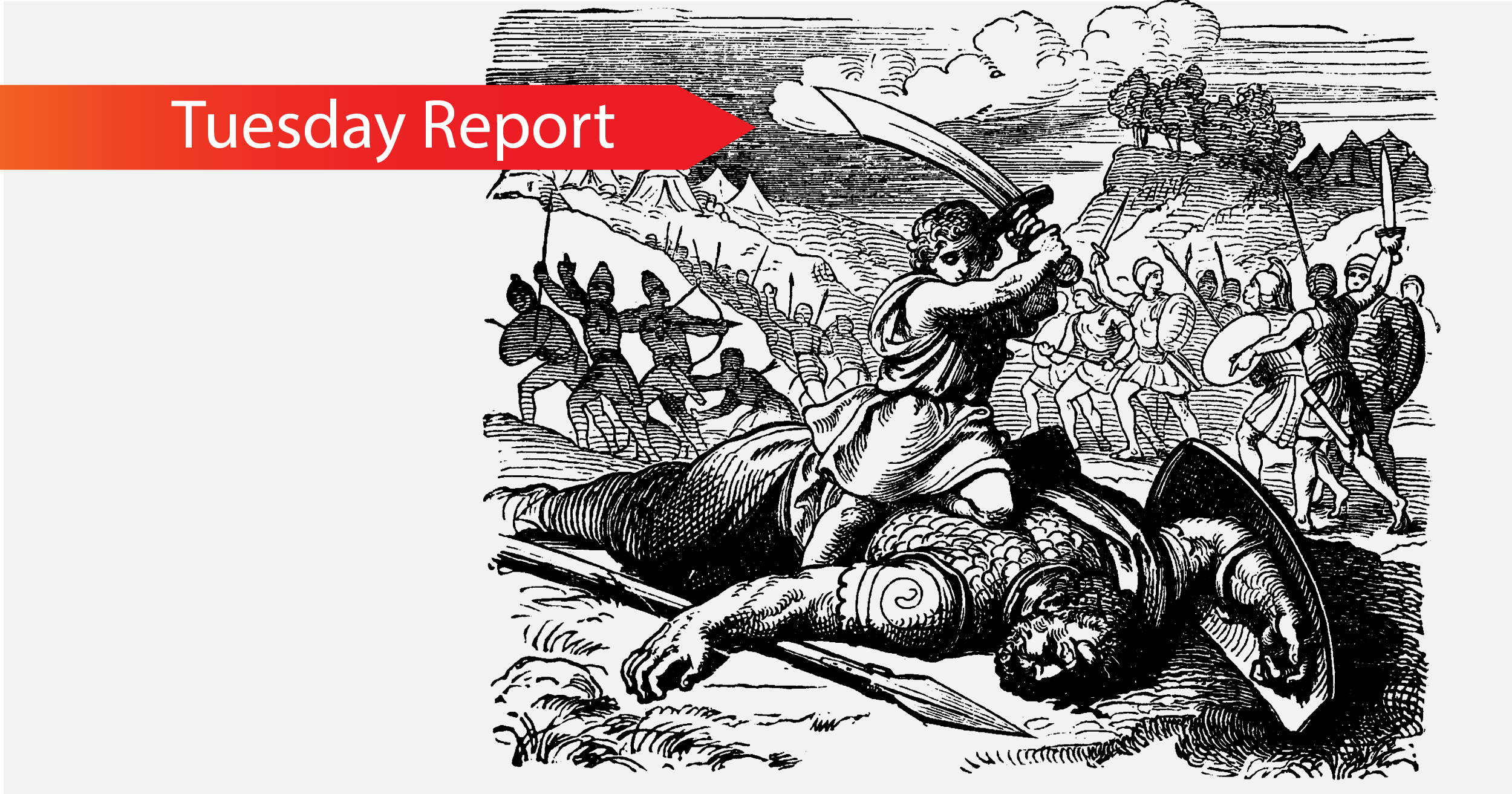How an Ancient Story Speaks Important Strategy to Organizations Today
Young David, against all odds, according to the story, defeated armor-clad giant Goliath with a single stone to the head from David’s slingshot.
Death by slingshot was the proximate cause of the giant’s death . . .
. . . but ASSUMPTIONS killed Goliath.
And assumptions today are the greatest threats to careers and organizations.
Few of us as children were not mystified by the ancient biblical story of a slight young shepherd named David confronting a 9 ft giant called Goliath, clothed in a 120 lb. coat of mail, holding an enormous death-wielding spear. The story, which appears in I Samuel 17 in the Torah/Old Testament is also a part of Islamic traditions.
The story of David and Goliath is almost always used to illustrate overcoming odds.
The mighty ancient Philistine army was pitted against the Israelites, camped within shouting distance of each another, the Philistines with the upper hand. At their forefront was Goliath who came out each morning, shouting that the battle could be simplified with a man to man duel between himself and any Israelite chosen.
Up to that point, nobody was in the mood to fight Goliath until young David volunteered. The victory in the battle was between the old assumptions about warfare held by both armies and the new assumptions and ideas of David.
Both armies fought battles based on their old assumptions about the way armies ought to fight.
1. The Rules of War. They both fought by “the rules of war,” which prevailed at the time, which were drawn around battle lines, one army on one side and one on the other.
2. What’s a Good Army. The winning army had stronger soldiers, well trained, well fed and equipped, with armor, shields, and swords
3. How to Fight Hand-to-Hand Combat. In hand to hand combat, it was the biggest and strongest would never fail to win.
David’s New Assumptions Killed the Giant—that Work for Today
1. Faith as a Weapon—Ideas and Values Win Over Size and Strength. More than his slingshot, David used his own faith as his most effective weapon. David believed he was destined to win. Faith is a person’s most powerful weapon. If you don’t know where you’re going and you don’t have the faith you’ll get there, you’ll never arrive. Use faith as an effective weapon of battle.
If you have faith in yourself and your future, you’ll have a greater advantage than even superior education and skills. Steve Jobs, the Thomas Edison of our times, never finished college. Bill Gates, the founder of Microsoft, dropped out of college because he didn’t have time. Their greatest advantage was that they saw their vision and moved forward to achieve it.
2. Traditional Armor Would Weigh David Down—He Used His Agility. The Israelite King, Saul. tried to equip David with traditional armor that David couldn’t carry and didn’t know how to use. It was the traditional way to win.
In a modern context, stores like Sears had the weight of a hundred years of incredible success in merchandising—their catalogs was legendary. Yet in the digital age the Sears merchandising model killed an old and distinguished brand, because like armor on an ancient soldier, it couldn’t win in a modern setting. A company like Amazon, beginning as an online bookstore, choked the old merchandising stores with technology and agility.
3. Goliath’s Giant-Size was a Disadvantage. David saw Goliath’s height and strength as a disadvantage to Goliath, not as an advantage. The cumbersome giant moved slowly and lacked the ability to run or fight effectively. He was too big to survive.
It is often thought that small entrepreneurs and great ideas are no match for the large, well-funded organizations. History shows those assumptions to be false. Bill Gates, the founder of Microsoft, once said that he did not fear his known competitors, but the entrepreneur in the garage with a great idea. Larry Page and Sergey Brin, in their early twenties, had some innovative ideas about search engine algorithms and tried to sell them to large search engine companies, but nobody bought. This caused them to found Google, one of the most successful companies in the world—a David-like advantage over Goliath.
4. Goliath was the Real Underdog—Not David. The narrative about David and Goliath has been told over the Centuries as an amazing win by small and weak David over powerful Goliath. In fact, the opposite is true. In the eyes of those who witnessed the confrontation and to the many who have retold the story, Goliath held the real advantage and it was virtual suicide to anyone who challenged him.
The truth was quite different, however. Goliath was huge and most probably diseased by giantism, which most often afflicts people of mega-size. At best, he creaked when he moved. Goliath’s assumption was that his size would make him so feared that nobody would seriously come against him. He assumed that the young man before him was of no threat or consequence. David, on the other hand, was a pioneer in asymmetrical warfare. Instead of wielding a sword and shield, he went to the river to pick up three stones. His skill with that weapon was deadly. Experts with slingshots have been known to hit a flying bird in midair. To strike Goliath between the eyes was an easy target.
This story is ancient, but modern, and is highly impactful on a person who understands it. When confronted with the worst crisis you’ve ever faced, if you stand up to the challenge without out fear and using your best skills, the chances of winning for you are better than ever.






